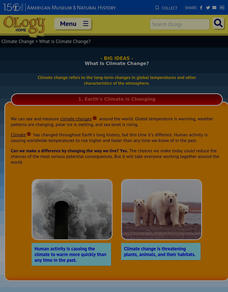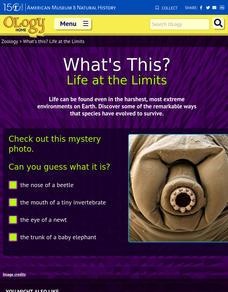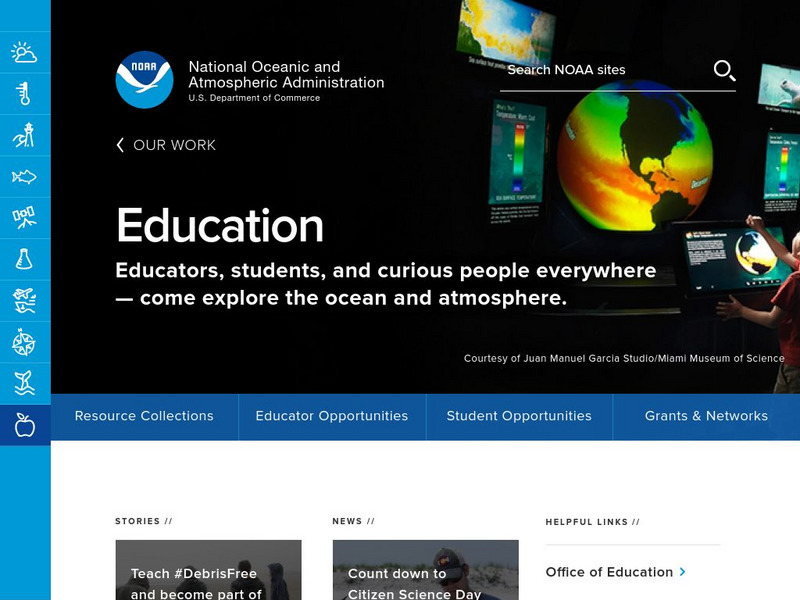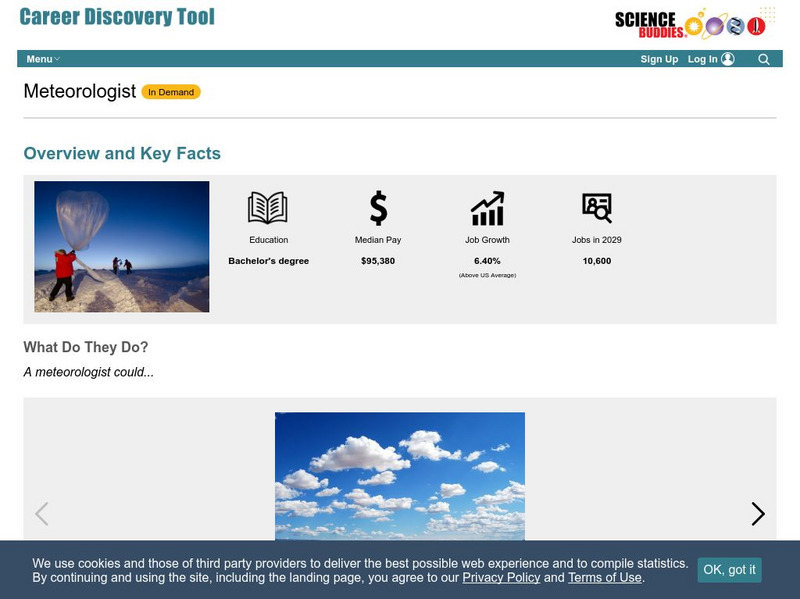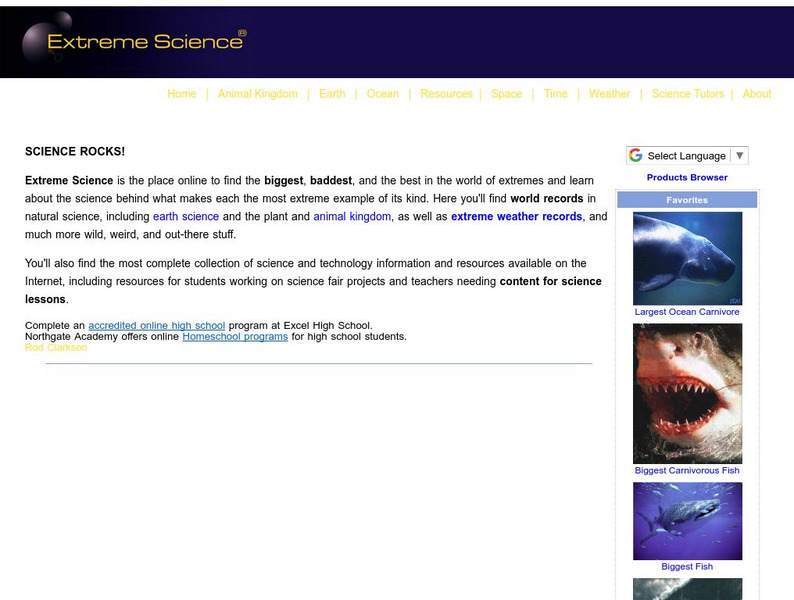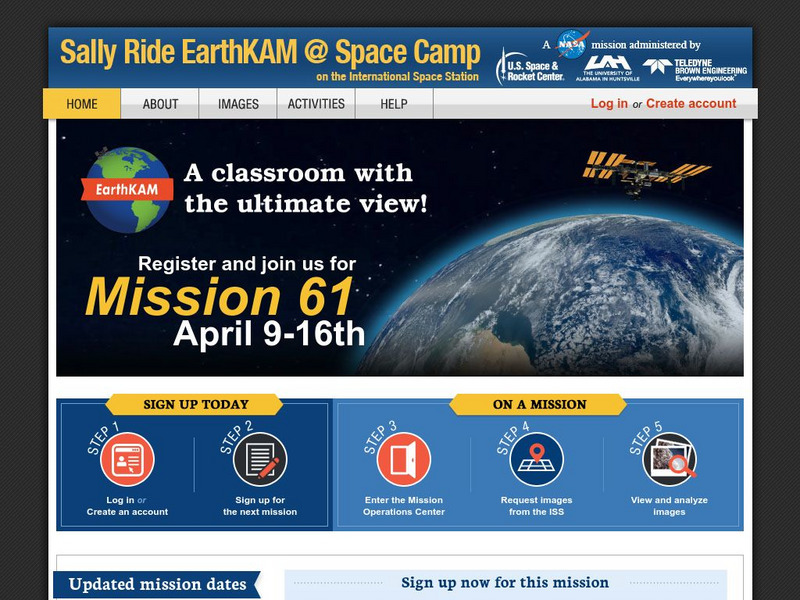American Museum of Natural History
What is Marine Biology?
A marine environment covers the majority of the earth but is arguably the least understood. Teach young scientists about the characteristics of oceans and ocean species using an interactive online lesson. The in-person or remote learning...
American Museum of Natural History
Tornadoes Spinning Thunderstorms
Tornado winds can reach more than 200 miles per hour. Learners explore wind speeds and more characteristics of tornadoes with an online lesson. They learn how tornadoes form and how scientists attempt to predict them. Can be used as an...
American Museum of Natural History
What Is Climate Change?
So many factors show that climate change has arrived. Learners read through an online resource that explains the data and the consequences of climate change. They also review strategies for slowing or even reversing the global influence.
American Museum of Natural History
What's This? Life at the Limits
There are some amazing ways species evolve to survive. From large ears to sneezing salt, learners read about these interesting adaptations in an interactive lesson. Great to supplement an in-class lesson, it also works well as a remote...
Extreme Science
Extreme Science
Explore the science behind the "extremes" in our world. Organized into sections on earth science, the animal kingdom, technology, and space science, this site opens your eyes to giant creatures, amazing technological advances, vast...
Oswego City School District
Regents Exam Prep Center: Earth Science
Resource for earth science review, with the following topics covered: composition of the Earth, mapping, rocks and minerals, weathering, and earthquakes. Includes a collection of online quizzes, review materials, old exams, and references.
NOAA
Noaa: Education Resources
Links to earth science sites, including safety tips, fun activities, general earth science information, and daily weather reports and more.
Science Buddies
Science Buddies: Career Profile: Meteorologist
As Bob Dylan once sang, you don't need a weatherman to know which way the wind blows, but you do need one to tell you why it's blowing. Science Buddies provides a career profile for a meteorologist and what the career entails. Find out...
Extreme Science
Extreme Science
Find the biggest, baddest, most extreme of everything science all in one place. Includes wild topics in earth science, life science, space science, weather, oceanography, and technology.
Science Museum, London
Science Museum: Climate Science Info Zone
Media-rich interactive explores Earth's climate, investigating what might be causing the climate to change and how to prepare for it in the future.
Other
Nasa: Iss Earth Kam
Students get a whole new perspective of the world through images obtained from the International Space Station. Students can even request images to be taken through ISS EarthKAM. Activities and educator guides are provided.
NASA
Climate Kids: Climate Change Trivia
Fun website for kids on earth science presents trivia game in which students can test their knowledge on what they have learned about climate.
Ducksters
Ducksters: Earth Science for Kids: Weather Forecasting and Meteorology
On this website, students can learn about weather forcasting and meteorology including cold and warm fronts, high and low pressure systems, fun facts, and technology.
Ducksters
Ducksters: Earth Science for Kids: Weather: Wind
Kids learn about wind including how it is formed, how it is measured, local and global winds including prevailing, westerlies, trade, and polar easterlies.
Ducksters
Ducksters: Earth Science for Kids: Weather Glossary and Terms
Explore the concepts of climate, cloud, front, dew, fog, humidity, isobar, supercell, and thunderstorm on this site.
Ohio State University
Osu: Beyond Weather and the Water Cycle: The Sun: Earth's Primary Energy Source
Extensive article that discusses the first principle of climate science, i.e., that the Sun is the primary energy source for the climate system of the Earth. Presents five concepts for this principle and explains each, providing...
Other
Koshland Science Museum: Earth Lab: Degrees of Change
This resource provides information on all of the aspects of global warming, climate change, and the future of the earth.
Ducksters
Ducksters: Earth Science for Kids: Weather: Clouds
Kids learn about clouds including how they form, levels, fun facts, and types of clouds such as cirrus, cumulus, and stratus.
Ducksters
Ducksters: Earth Science for Kids: Weather: Tornadoes
Explore tornadoes on this website! Kids learn about tornadoes including how they form, characteristics, types including supercell and waterspout, categories, and fun facts.
Ducksters
Ducksters: Earth Science for Kids: Tsunamis
Investigate tsunamis including what causes them such as earthquakes, where they occur, why they are dangerous, and what happens during a tsunami event on this website.
Scholastic
Scholastic: Study Jams! Science: Earth's Oceans
Oceans contain 97% of the water on the Earth and are home to a huge number of living creatures. View an informative slideshow of the ocean and its inhabitants and then test yourself on what you learned.
University Corporation for Atmospheric Research
Ucar: Living in the Greenhouse
Check out the whole story of climate from ancient times through greenhouse gasses with this interactive resource.
Ducksters
Ducksters: Science for Kids: Earth's Atmosphere
Kids learn about the science of the Earth's Atmosphere. Carbon dioxide, Oxygen, Nitrogen and more make up clouds and weather.
Other
Planet Ark: World Environmental News
Welcome to Planet Ark's daily Reuters World Environment News - the most comprehensive source of environmental news on the Net. To read previous news stories, please use the search engine below to find stories relating to any...


